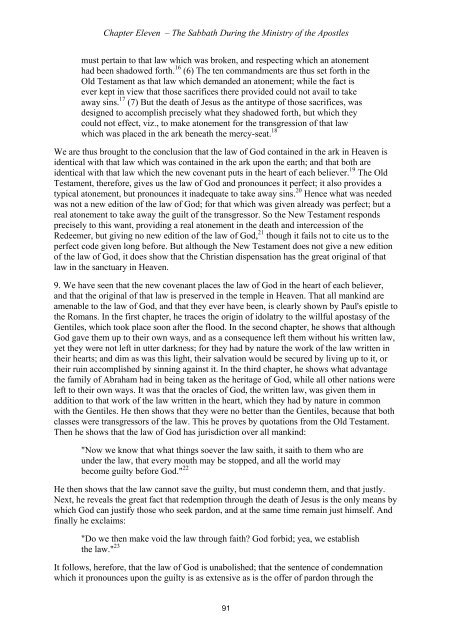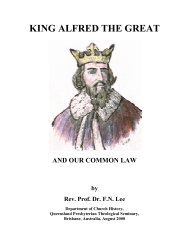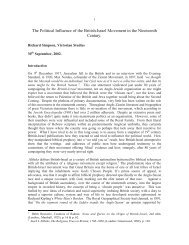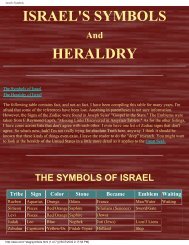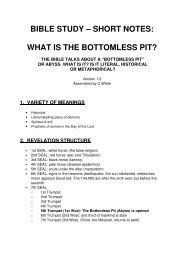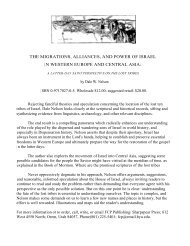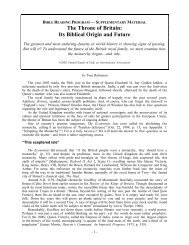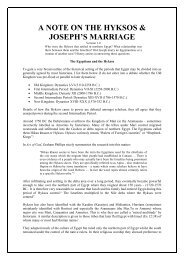HISTORY OF THE SABBATH - Friends of the Sabbath Australia
HISTORY OF THE SABBATH - Friends of the Sabbath Australia
HISTORY OF THE SABBATH - Friends of the Sabbath Australia
You also want an ePaper? Increase the reach of your titles
YUMPU automatically turns print PDFs into web optimized ePapers that Google loves.
Chapter Eleven – The <strong>Sabbath</strong> During <strong>the</strong> Ministry <strong>of</strong> <strong>the</strong> Apostlesmust pertain to that law which was broken, and respecting which an atonementhad been shadowed forth. 16 (6) The ten commandments are thus set forth in <strong>the</strong>Old Testament as that law which demanded an atonement; while <strong>the</strong> fact isever kept in view that those sacrifices <strong>the</strong>re provided could not avail to takeaway sins. 17 (7) But <strong>the</strong> death <strong>of</strong> Jesus as <strong>the</strong> antitype <strong>of</strong> those sacrifices, wasdesigned to accomplish precisely what <strong>the</strong>y shadowed forth, but which <strong>the</strong>ycould not effect, viz., to make atonement for <strong>the</strong> transgression <strong>of</strong> that lawwhich was placed in <strong>the</strong> ark beneath <strong>the</strong> mercy-seat. 18We are thus brought to <strong>the</strong> conclusion that <strong>the</strong> law <strong>of</strong> God contained in <strong>the</strong> ark in Heaven isidentical with that law which was contained in <strong>the</strong> ark upon <strong>the</strong> earth; and that both areidentical with that law which <strong>the</strong> new covenant puts in <strong>the</strong> heart <strong>of</strong> each believer. 19 The OldTestament, <strong>the</strong>refore, gives us <strong>the</strong> law <strong>of</strong> God and pronounces it perfect; it also provides atypical atonement, but pronounces it inadequate to take away sins. 20 Hence what was neededwas not a new edition <strong>of</strong> <strong>the</strong> law <strong>of</strong> God; for that which was given already was perfect; but areal atonement to take away <strong>the</strong> guilt <strong>of</strong> <strong>the</strong> transgressor. So <strong>the</strong> New Testament respondsprecisely to this want, providing a real atonement in <strong>the</strong> death and intercession <strong>of</strong> <strong>the</strong>Redeemer, but giving no new edition <strong>of</strong> <strong>the</strong> law <strong>of</strong> God, 21 though it fails not to cite us to <strong>the</strong>perfect code given long before. But although <strong>the</strong> New Testament does not give a new edition<strong>of</strong> <strong>the</strong> law <strong>of</strong> God, it does show that <strong>the</strong> Christian dispensation has <strong>the</strong> great original <strong>of</strong> thatlaw in <strong>the</strong> sanctuary in Heaven.9. We have seen that <strong>the</strong> new covenant places <strong>the</strong> law <strong>of</strong> God in <strong>the</strong> heart <strong>of</strong> each believer,and that <strong>the</strong> original <strong>of</strong> that law is preserved in <strong>the</strong> temple in Heaven. That all mankind areamenable to <strong>the</strong> law <strong>of</strong> God, and that <strong>the</strong>y ever have been, is clearly shown by Paul's epistle to<strong>the</strong> Romans. In <strong>the</strong> first chapter, he traces <strong>the</strong> origin <strong>of</strong> idolatry to <strong>the</strong> willful apostasy <strong>of</strong> <strong>the</strong>Gentiles, which took place soon after <strong>the</strong> flood. In <strong>the</strong> second chapter, he shows that althoughGod gave <strong>the</strong>m up to <strong>the</strong>ir own ways, and as a consequence left <strong>the</strong>m without his written law,yet <strong>the</strong>y were not left in utter darkness; for <strong>the</strong>y had by nature <strong>the</strong> work <strong>of</strong> <strong>the</strong> law written in<strong>the</strong>ir hearts; and dim as was this light, <strong>the</strong>ir salvation would be secured by living up to it, or<strong>the</strong>ir ruin accomplished by sinning against it. In <strong>the</strong> third chapter, he shows what advantage<strong>the</strong> family <strong>of</strong> Abraham had in being taken as <strong>the</strong> heritage <strong>of</strong> God, while all o<strong>the</strong>r nations wereleft to <strong>the</strong>ir own ways. It was that <strong>the</strong> oracles <strong>of</strong> God, <strong>the</strong> written law, was given <strong>the</strong>m inaddition to that work <strong>of</strong> <strong>the</strong> law written in <strong>the</strong> heart, which <strong>the</strong>y had by nature in commonwith <strong>the</strong> Gentiles. He <strong>the</strong>n shows that <strong>the</strong>y were no better than <strong>the</strong> Gentiles, because that bothclasses were transgressors <strong>of</strong> <strong>the</strong> law. This he proves by quotations from <strong>the</strong> Old Testament.Then he shows that <strong>the</strong> law <strong>of</strong> God has jurisdiction over all mankind:"Now we know that what things soever <strong>the</strong> law saith, it saith to <strong>the</strong>m who areunder <strong>the</strong> law, that every mouth may be stopped, and all <strong>the</strong> world maybecome guilty before God." 22He <strong>the</strong>n shows that <strong>the</strong> law cannot save <strong>the</strong> guilty, but must condemn <strong>the</strong>m, and that justly.Next, he reveals <strong>the</strong> great fact that redemption through <strong>the</strong> death <strong>of</strong> Jesus is <strong>the</strong> only means bywhich God can justify those who seek pardon, and at <strong>the</strong> same time remain just himself. Andfinally he exclaims:"Do we <strong>the</strong>n make void <strong>the</strong> law through faith? God forbid; yea, we establish<strong>the</strong> law." 23It follows, herefore, that <strong>the</strong> law <strong>of</strong> God is unabolished; that <strong>the</strong> sentence <strong>of</strong> condemnationwhich it pronounces upon <strong>the</strong> guilty is as extensive as is <strong>the</strong> <strong>of</strong>fer <strong>of</strong> pardon through <strong>the</strong>91


